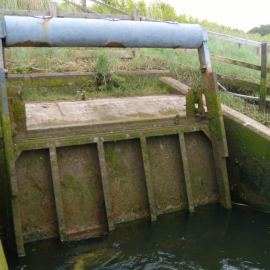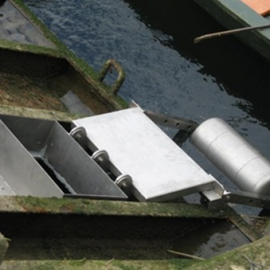Tide gates are used in estuaries worldwide for land reclamation, flood prevention and insect control. Tide gates form a temporal barrier to fish movement, closing during the flood tide to preclude brackish water from moving upstream and opening during the ebb to discharge freshwater. In addition, when tide gates are open, the size of aperture, hydraulic conditions, lack of tidal cues, abrupt salinity and temperature gradients, and the presence of overhead cover may cause further physical or behavioural barriers to fish migration.
Using acoustic and Passive Integrated Transponder (PIT) telemetry, this project assessed the impact of tide gates on the migration of European eel (Anguilla anguilla) and sea trout (Salmo trutta) between spawning and maturation habitats. The influence of novel modifications to tide gates such as flapped and un-flapped orifices, also known as pet doors, on migration were investigated. Results suggest that modifying or replacing top-hung tide gates with designs that open wider and for longer could reduce migratory delay for these species. This research was funded by the University of Southampton and the Environment Agency (England), in association with CEFAS and the Interreg IVB Living North Sea Project.
Media:
Publications:
Wright, G.V., Wright, R.M. & Kemp, P.S. (2014). Impact of tide gates on the migration of juvenile sea trout, Salmo trutta. Ecological Engineering 71: 615-622.
Wright, G.V., Wright, R.M. & Kemp, P.S. (2015). Impact of tide gates on the migration of adult European eels, Anguilla anguilla. Estuaries and Coasts, 38: 2031-2043.
Wright, G.V., Wright, R.M., Bendall, B. & Kemp, P.S. (2016). Impact of tide gates on the upstream movement of adult brown trout, Salmo trutta. Ecological Engineering 91: 495-505.
People:
Dr Gillian Wright
Dr Malcolm Hudson
Prof Paul Kemp
Prof Robert Nicholls


